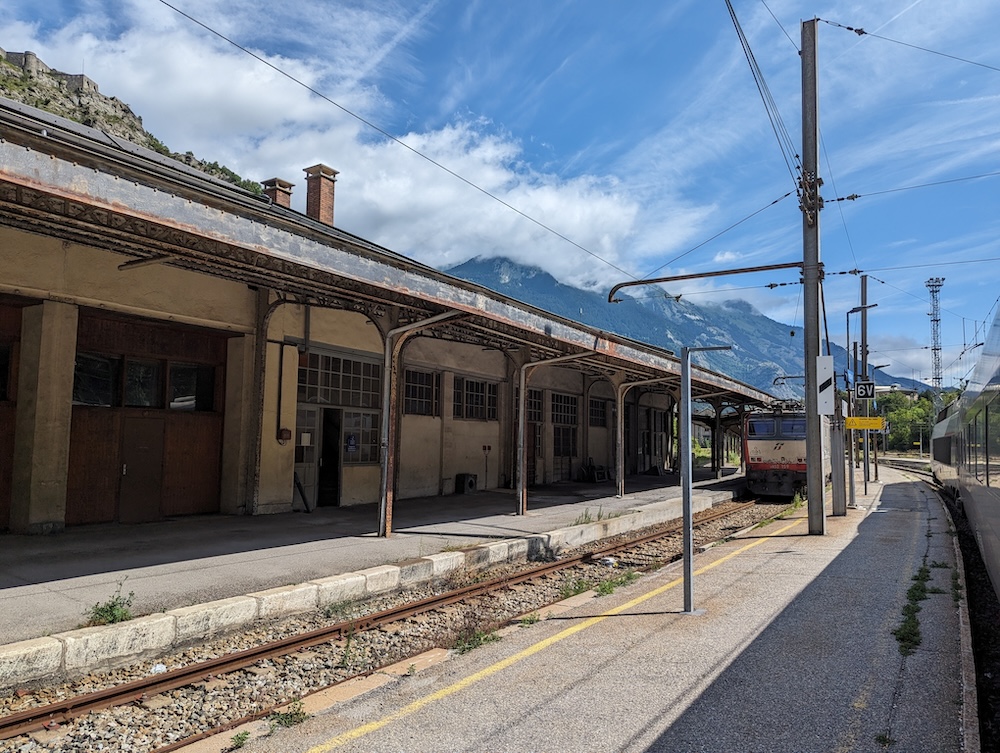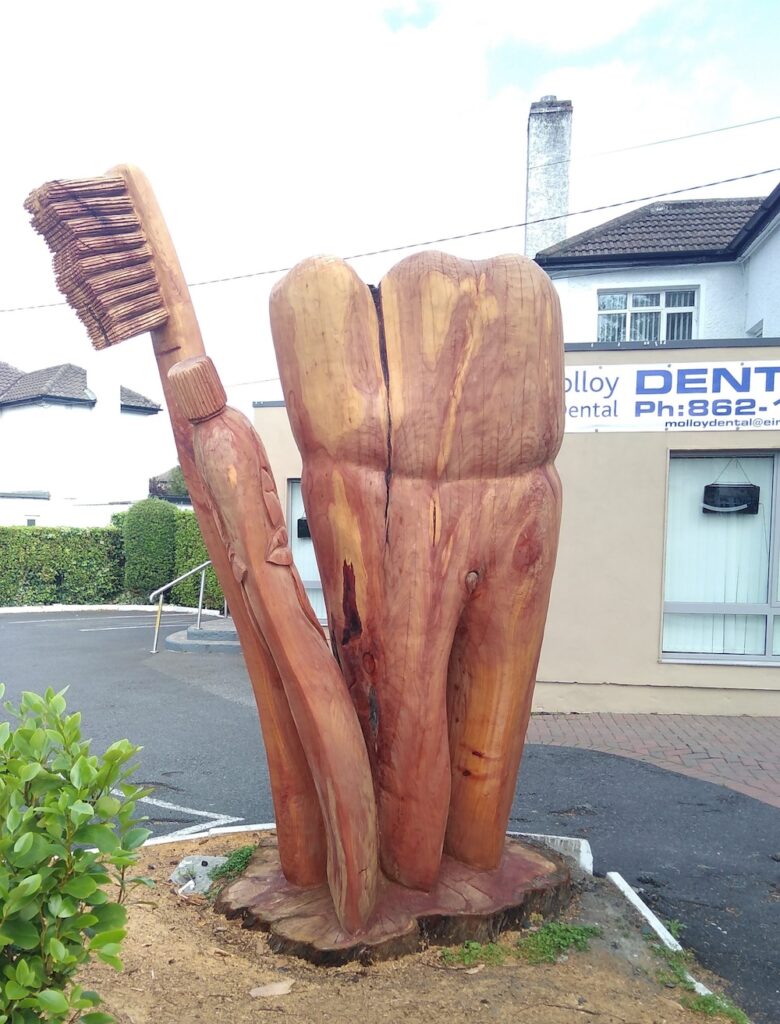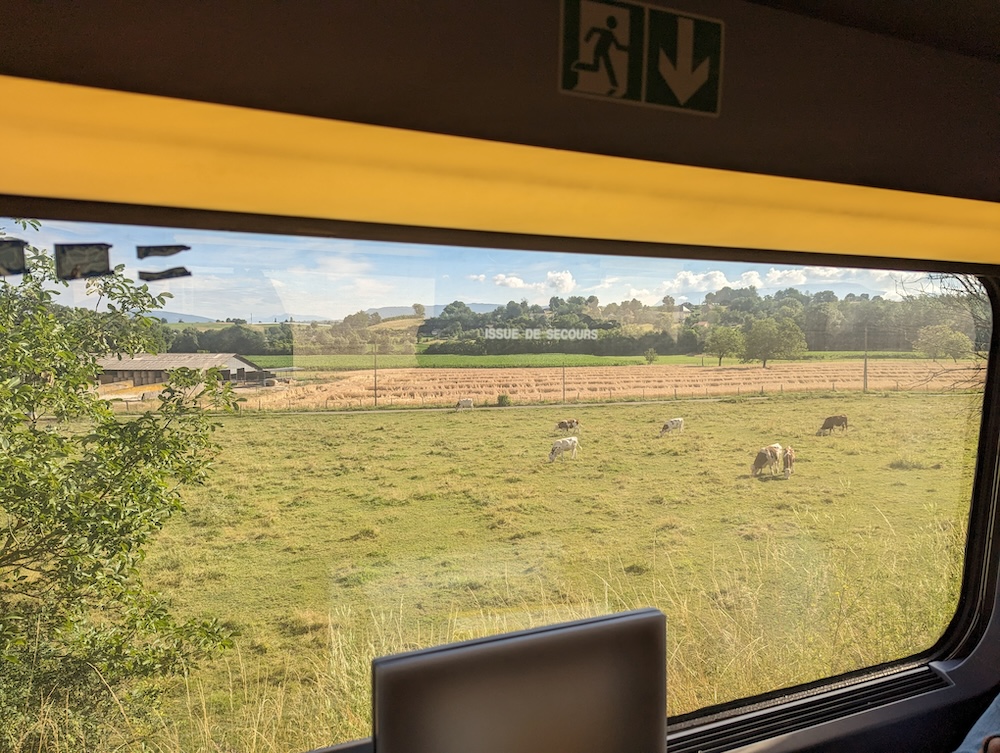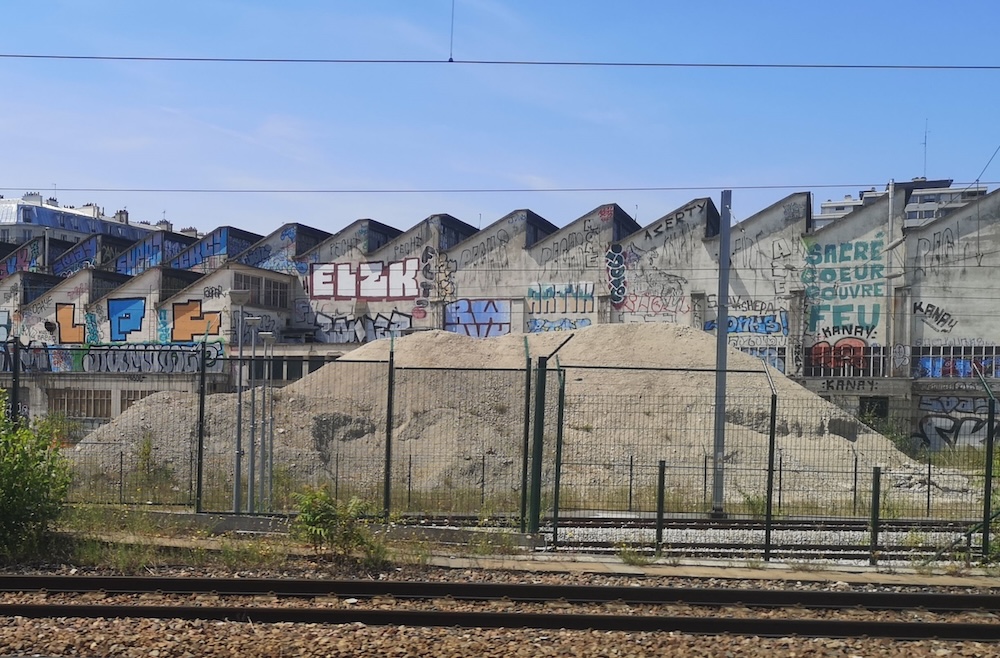Tamsin Grainger looks back over a year of slow travel.

I’m going to start by talking about the weather. Bear with me!
This past year the UK temperatures have ricocheted from proper cold to mild, the rain levels have surged from flood to drought, and the wind gusted from almost-hurricane to breezy zephyr. I’ve been drenched on the bike day after day, squelched along park paths with the mud at times when it’s usually dry, felt the hot sun penetrating my naked arms in a way that’s more like Portugal than Scotland where I live, and given up using an umbrella because it’s constantly blowing inside out. Of course, winter’s never been all cold or all dark, just like summer isn’t always sunny; there’s no such thing as a pure season, but it’s certainly more extreme these days. The BBC writes that in March we had 107.8mm of rain compared with the average of 84.9mm, so it ranks in the top 20% of wettest Marches, and this UK summer was the hottest on record. We must get used to the fact that the climate is variable, changeable, relentlessly unpredictable.
Which causes a problem. We like to make definitive generalisations, unequivocal ones, because it means moaning, and making excuses for our behaviour is easier. I heard a woman yesterday emphatically tell someone next to her on the #23 bus: “There was no summer this year.” “Quite right,” came the doleful reply. The woman went on, “So we’ve booked a flight to Almeria for 2025, to be on the safe side”. There were, in fact, hot days in Edinburgh, though she’s right that Spain will probably be hotter still — but then again, it might not be. It’s recently been scorching in Madrid in Spring (26 degrees on 11 April) and sunken in October (those devastating floods in Valencia), so there’s no normal, no way of knowing definitively how things will be in the future.
Listening to her, the part I caught myself wanting to respond to was the flying. “Taking a plane somewhere isn’t going to improve the weather situation now is it!” I wanted to retort. She didn’t mean to draw attention to that, but it was what I noticed because I have recently made a pledge that I’m passionate about:
I don’t travel by aeroplane any more.
Other than the voucher for a flight from London to Athens which was left over from the pandemic and which I used in early 2023, all my travelling has been overland. To get home from Greece after that, I returned via Northern Macedonia and Berlin using the bus and on foot, and since then I’ve journeyed back and forth, again to Greece and twice to Spain, all by public transport. I’ve passed through Bosnia and Herzegovina and Switzerland, walked through parts of Serbia, Slovenia and Croatia, and been held up for a long time at various borders, including the Hook of Holland before boarding the ferry. There, an officious man silently flipped through the pages of my passport and looked at me, flipped and looked. Eventually I asked if there was a problem and he said he wanted to know why I’d gone out of the Schengan area but not been stamped back in. When I said I didn’t know, he sighed and let it go. Maybe, on balance, he decided that the diminutive, middle-aged, Caucasian woman in front of him with a backpack almost the same size as her wasn’t that much of a threat.
During the Covid years (2020-2021) so many of us pledged that we’d never go back to the way we were, but Airports Council International write: ‘The current projection for 2024 estimates global passenger volume at approximately 9.5 billion, representing 104% of the 2019 level and a 10% year-on-year (YoY) growth from 2023.’ I decided, enough is enough. I could not go around saying that I wanted to counteract the effects of global warming and help mitigate the climate emergency yet stick with only putting the wine bottles in the recycling; I had to do more than that. I had to put my feet where my mouth was, so to speak. I know I’m just one person and you could ask, ‘How much difference can it make?’ but I’m doing it anyway because I believe that when my energy changes it’s got to have an effect somehow. When I alter my behaviour, at least one other person or aspect of the natural world I’m seeking to protect will change in response, even if I can’t identify precisely who or where.
As a Taoist practitioner, I work with the law of Yin and Yang, a concept used to show that the universe is constantly keeping itself in balance. This is a different way of thinking about things. Usually we fear the ongoing increase, everything moving in one direction and getting worse, but this law states that equilibrium is always being sought, that change is inevitable to bring that about. Increased pollution means that the wind must blow stronger to move the air. Rises in fiery heat result in increased waters to put it out. It’s nature’s way, it has to do this. ‘The ten thousand things / carry the yin on their shoulders / and in their arms the yang / whose interplay of energy /makes harmony.’ (Tao Te Ching chapter 42 translated by Ursula K. Le Guin.)
While I believe that we are a part of the natural world, we’re not currently behaving according to these laws. There are a few people I know who also eschew aeroplanes and others nod in agreement but carry on flying to Amsterdam for the weekend regardless. However, if one other person questions their actions or participates in a debate because of me writing about it, and especially if this then affects more people, then that’s the knock-on effect happening, that’s the whole system working to keep itself level. Staying on the ground, I must tell you, is also a great way of having fun.

I started walking from place to place in 2016: first it was Dublin Airport to a city centre hostel via an incongruous ‘statue’ of a ginormous toothbrush and tooth that I would’ve likely missed had I been in a vehicle. Then across Paris from Gare du Nord to where I was working, along the Boulevard de Magenta selling bridal gowns and every type of shoe, through Barbès with its hustling and dealing, and through the stinky underpasses at Porte de Clignancourt. I took trips to somewhere by boat, train, and on lots of buses as well, and soon realised that it was no longer about where I was ending up. What I was really doing was making a journey. It was not about the ‘destination’, it was about The Whole Expedition.
While it costs more to travel overland, and takes longer, it’s also wonderful. My understanding of the landscape of the countries I flow through is completely different, seeing the world at eye level rather than from 40,000 feet up. I can count the cows in fields outside Girona, and read the graffiti behind piles of grit without leaving my seat. There’s an unhurried view of the stunning mural at Invergordon station where a little boy with a saucepan on his head waves goodbye to a kilt-wearing WWII Seaforth Highlander (soldier) on his way to fight in France in 1939. Between Turin and Lyon, I dream away while clouds shift to reveal snowy Alpen summits. Did you know that some French service stations have a library? Do you know how long it takes for a Greek tortoise to cross the road while the bus waits? Have you seen the pink flamingos wading ever so glutinously in the waters near Perpignan? It’s a slower way of going places and there is time to take notice, to hone in on the detail, to feel and to think.


Like Carlo Petrini in 1986, when he started protesting over Fast Food (a place beginning with ‘Mc’ in particular), Slow Travel prioritises quality of experience over speed and doing what’s cheapest. It makes me choose carefully whether to do it at all. ‘If I’m going to spend all that time getting somewhere,’ I reasoned after some time, ‘I might as well take a little more and stop off on the way.’ So, I use social media and my growing network of friends well-met ‘on the road’ to broadcast my basic route and I offer anyone near it a Shiatsu session in return for hospitality. (Shiatsu is a sort of bodywork/massage which is ideal for the open air and people I don’t know very well because you don’t have to take your clothes off to receive it.) I’ve détoured to Slovakia and the Lake Balaton area of rural Hungary, rather than zooming through Budapest without stopping. I’ve got to know residents (not just hostel staff), and local highlights, by staying in a vardo and, because I had time to kill before the next leg of my tour, I enjoyed a small basement museum full of crystals and precious stones.
In July, I was crossing Paris (I’d been in Cataluña and was travelling to Kent, which I can attest to being possible in one day if you go via Barcelona), and I’d left myself plenty of spare time before taking the Eurostar. It was the first Friday of the month and I usually walk with an artist’s collective on that day, wherever I am in the world. The brief was to go along a former railway line, a naturalised route, at around 1.15pm. I looked up ‘greenway in Paris’, hoping for somewhere between Gare de L’Est and Gare du Nord and voilà! I’d never heard of the Coulée verte René-Dumont promenade plantée (12th arrondissement, Bastille), but there it was, not more than 10 minutes’ walk from where I alighted, suspended above all the bustle of the city. Dumont (1904 – 2001) was an engineer, sociologist and politician who I learned was a signatory of the agreement to adopt a world constitution for the Federation of Earth. How fantastic! A forefather of the French Green Party, his namesake is a pathway of flowers, birds, and insects with humans sauntering amongst them in their lunch hour. I was going slow and things simply fell into place.
I’ve had to practise this sort of fluid and loose itinerary, it’s taken some courage, but I know now that leaving space and some arrangements until the last minute — or to chance — can yield rich meetings. If I’m tight and fearful: ‘What if I don’t find somewhere to sleep? What if I don’t get what I need?’ I miss out on opportunities. Sometimes it does seem as if I’m in big trouble and then I must rely on others to help me. As a result, I’m invariably faced with the sort of generosity that I would never have thought existed. I was once walking over the three sacred mountains between Vienna and Mariazell (the Santiago de Compostella of Austria) and arrived in a small town with only one hostelry. The owner’s wife had unfortunately been taken to hospital and he’d shut up shop. What to do? It was nearly dark and I asked at a local pub outside where many people were milling around. Someone kindly bought me a drink and sat me down. Someone else phoned around. Between them, they not only found and booked me a room in a hotel in the next town, but one woman bundled me and my huge rucksack, together with her child, into her car and drove me there, coming in to make sure I was introduced to the receptionist.
2024 is the year I’ve strengthened my resolve for Slow Travel. It’s the year when I’ve been able to gather together my underlying feelings and articulate the real benefits. I’m determined to acknowledge the changeability of the weather, to support the restoration of the wildlife and wildlands we need so badly, and move towards a greater harmony. I’m also looking forward to 2025 when I’m due to be in Athens again – I’ll have pleasure finding a new way to get there and back overland. Have you tried it?
*
Tamsin Grainger is a writer, bodyworker and walking artist living in Edinburgh. Visit her website here. Her Walking Without a Donkey project, chronicling her international long-distance walks, can be found here.